Yesterday evening I took part in a Public Debate at Saïd Business School, organised by the Centre for New Economies of Development – a collaboration between the Universities of Oxford, Sussex and Edinburgh. The event also saw the launch of a new website to encourage academic discussion and knowledge sharing on the BoP: responsiblebop.com
Below is a slightly expanded version of my remarks.
There is something incredibly exciting happening at the interface of business and international development. Something that flies in the face of the traditional ideological positions that people have taken in past, and that some seem adamant to maintain. Something filled with an energy and positivity that I have not seen in my 20 years working on international development. Don’t let today’s debate format fool you. Because at the heart of what is happening right now is a level of collaboration and innovative partnering unlike anything that has come before.
Perhaps most exciting is that the starting point is a clear understanding of what poor people themselves see as their strategy for achieving a better life for their families. Getting a job or growing a business. Development has for too long seen poor people as passive recipients of a paternalistic and frankly patronizing approach to development. But now, poor people are being viewed as agents of their own development.
What we are seeing now is a flourishing of innovative business models that seek to include poor people – as employees, as suppliers, as distributors. New business approaches to bring, often for the first time or for a fraction of the cost, goods and services to poor people, valued as customers. We are seeing donor agencies and NGOs – traditionally hesitant – finding new ways to partner with the private sector to enable poor people to access and succeed in markets. We are seeing businesses – traditionally focused on philanthropic CSR – actively exploring how they can better understand and enhance the impact of their core business operations, whether through local sourcing or through new products and services.
The reason I set up Business Fights Poverty 4 years ago was because I was overwhelmed by the level of creativity that was happening in this space, but that was very often happening in isolation. My mission was to try and join these intense, but often dispersed pockets of energy and knowledge. We now connect over 10,000 professionals from over 200 countries – people who think about this all day, every day. I continue to be amazed by what is happening on the ground right now, right across the world.
Just take a look at this week’s stories on Business Fights Poverty.
The GSMA Development Fund – featured in a webinar we have just co-hosted with the Business Call to Action – is aiming to reach 20 million previously unbanked people with mobile financial services by 2012. How? By bringing together mobile operators in developing countries, banks, microfinance institutions, governments, development organizations and the private sector, and by catalyzing innovative, commercially viable business models. Video from the event will shortly be posted here.
NextBillion and Ashoka have just launched an eBook on business-driven solutions to affordable housing for the world’s low-income consumers and producers. Read the blog by NextBillion’s Managing Editor, Scott Anderson, here.
FSG, a consultancy, has just published a report on how the pharmaceutical sector is making the transition from the past practices of addressing patients in low-and middle-income countries through philanthropy and CSR to treating the poor as customers. Read the blog by FSG’s Kyle Peterson and Samuel Kim here.
Finca, a not-for-profit microfinance institution, yesterday posted an inspiring client story from Zambia. Thanks to FINCA, 36-year-old Victoria Banda has been able to build up her food retail business – transforming her, as she put it, into the ‘pillar’ of her family, supporting her mother and close relatives, and supporting her younger sister through college. Read the full story here.
ToughStuff, a leading micro-solar social enterprise, has spotted a major business opportunity in Africa that can transform people’s lives. Did you know that by the end of last year there were over 600 million mobile phone subscribers in Africa, making it the continent with the highest number of mobile phone subscribers. We all know about the benefit that mobiles bring – enabling people not just to connect but to access financial, medical and other services. But using a handset is one thing; charging it is quite another. 1.3 billion people, don’t have access to mainline electricity. Tough Stuff has not only introduced a solar panel the size of a paperback that can charge a phone, and that can pay for itself within a couple of months (replacing costly kerosene, batteries or paying someone else to charge your phone). But also partnering with NGOs – and their local partners – ToughStuff is creating a network of salespeople who can make an income as solar entrepreneurs – helping get the products the last mile, and helping generate incomes for the entrepreneurs. This story was set out in a blog by Susie Braun, On Purpose Associate, which you can read here.
The Gatsby Charitable Trust, which this week posted a job ad, is working with local institutions to transform Tanzania’s cotton and textiles sector by raising the yields of more than 400,000 smallholders and catalysing downstream industries. How? By introducing new contract farming arrangements, driving research into new seed varieties, and promoting improved farming practices and downstream skills. Read the job ad here.
The Chief Exec of NGO iDE UK, Lewis Temple, this week posted a story about how they are working to creating self-supporting female entrepreneurs in Africa and Asia by helping them access the right technologies and services that will in turn enable them to run businesses in farming. Read the blog here.
And finally, each week we highlight one Business Fights Poverty Member of Week, and this week we highlighted Rik Overmars, Mozambique Country Director, SNV Netherlands Development Organisation. Anyone interested in learning more about the BoP, really needs to look at the work SNV are doing. They have been active in 36 countries in Agriculture, Water, Sanitation & Hygiene and Renewable Energy. They partner with the private sector to build Inclusive Business programmes that establish strategic, long-term, win-win linkages between companies and the BOP either as suppliers, as distributors or as consumers. They have gathered 100 business cases in Latin America, Asia and Africa, and disseminate their knowledge through various platforms, notably inclusivebusiness.org with the World Business Council for Sustainable Development. Read the interview with Rik here.
They are 1,000s more stories just like these, with more coming every week, and each one as surprising and exciting as the next.
A central message I would like to leave you with is that “Business As Usual” has been left far behind by people and organisations like those I have mentioned. Be inspired, and seek to inspire those around you – by thinking creatively about how you can harness business to improve the lives of poor people at the base of the pyramid. And know this: whether you go on to work for a company, or to found your own business, or to work for an NGO or development agency that helps drive entrepreneurship – you have the power to make a huge and long-lasting difference, and at a scale that has only been dreamed of up till now.
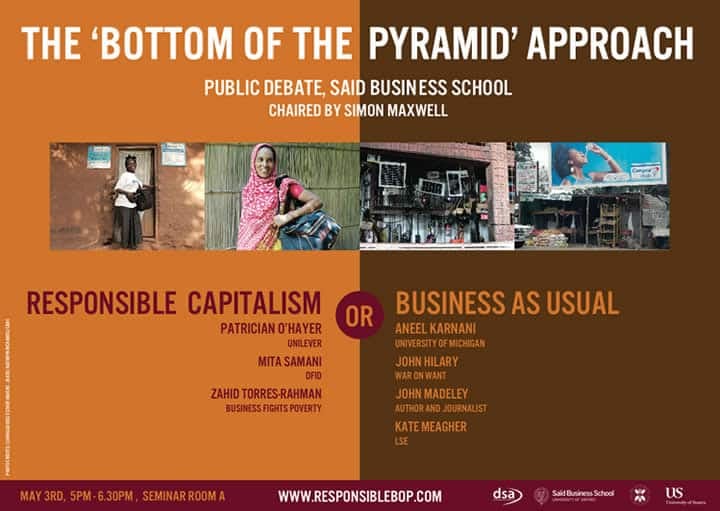


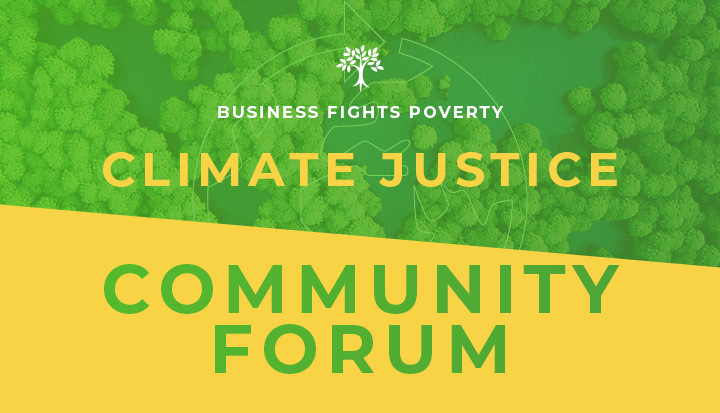
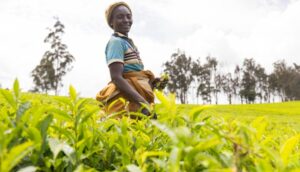
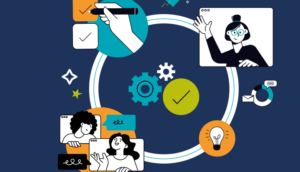
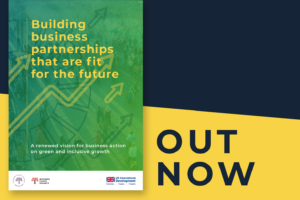
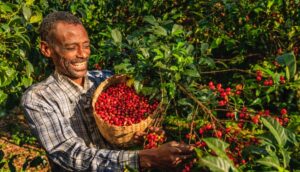



One Response
When I read this, I have to say I have tears in my eyes….Maybe because poverty is a subject that has been so many times in debates and discussions, yet it was not really showing any sign of improvement. When I joined Business Fights Poverty Platform, I was inspired by just those 3 words: Business – Fight- Poverty! Yes, I say to myself!
For long poor people, which I prefer to call, disadvantaged communities have been taken like people who cannot think, nor plan, not inspire or be creative. The change and shift we are experiencing in the development work, the Trade rather then Aid, etc….came not because poor people situation were improving but programs were not achieving the expected result. Change came because those on the Donors, Gvts, International Scene understood that Ownership, Sustainability can only happen when people are associated to their future and handouts are not helping. The shift in people mind is changing about potentiality existing in poor communities and the tremendous results since then registered. Thanks to many efforts today like those mentioned in your post, change as we expected is happening and everyday individuals are making impact around them and starting business with the spirit of making an impact not just on their immediate families but a whole community. Women’sInitiatives Network, an NGO, I have founded 2 years ago was also inspired by the positive change that made it easier for an immigrant, like myself, to join the effort in rebuilding and promoting initiatives in Africa by sensitizing Companies in Western Countries to work hand in hand with local initiatives on a partnership aspect rather then assistance. The role of Diaspora has also increased understanding and hope we all, fighting for the same purpose can continue to find common understanding of what need to be done to achieve the best result. It is a learning process, and as long as the vision is there, result will be achieved.